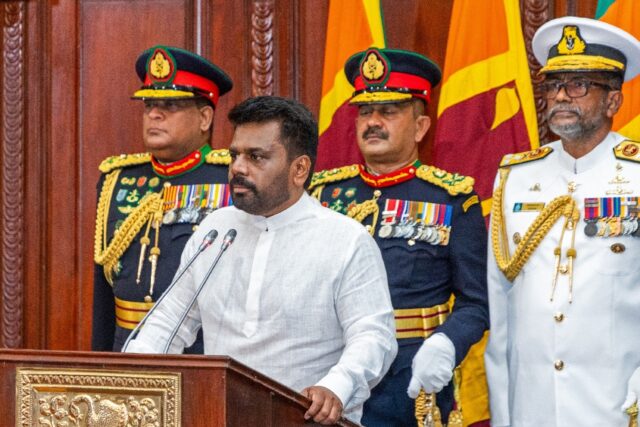Sri Lanka’s new leftist president dissolved parliament on Tuesday and called a snap election as he prepares to renegotiate the bankrupt nation’s unpopular International Monetary Fund bailout programme.
Self-avowed Marxist Anura Kumara Dissanayake of the People’s Liberation Front (JVP) was sworn into office on Monday after a landslide win in weekend presidential polls.
Late Tuesday he dismissed the 225-member legislature in which his once-marginal party had just three seats and scheduled an early election for November 14, nearly a year ahead of schedule, according to a notice in the official government gazette.
The order to dissolve parliament — whose term was due to end in August — comes into immediate effect.
Despite being a marginal party, the support for the 55-year-old Dissanayake’s JVP surged after a 2022 economic meltdown that immiserated millions of ordinary Sri Lankans and the painful implementation of the IMF rescue plan.
Earlier Tuesday his office announced the appointment of lawmaker Harini Amarasuriya, 54, as premier with the additional portfolios of justice, education, health, women’s affairs and labour.
A fellow party MP, Vijitha Herath, was made the new foreign minister with additional responsibilities over public security. Dissanayake retained the defence, energy and agricultural portfolios.
The new premier, a sociology lecturer first elected to parliament four years ago, is known for her activism on gender equality and minority rights issues.
The group will share all ministerial responsibilities between them, and also act as caretaker ministers after parliament is dissolved.
“We will have the smallest cabinet in the history of Sri Lanka,” party member Namal Karunaratne told reporters on Tuesday.
Just before the dissolution of parliament the government announced that Dissanayake will address the nation on Wednesday night.
Sri Lanka’s crisis proved an opportunity for Dissanayake, who saw his popularity rise after pledging to change what he called the island’s corrupt political culture.
He beat 38 other candidates to win Saturday’s presidential vote, taking more than 1.2 million more votes than his nearest rival.
His predecessor Ranil Wickremesinghe, who had imposed steep tax hikes and other unpopular austerity measures under the terms of the $2.9 billion IMF bailout, came a distant third.
The IMF offered its congratulations to Dissanayake on Monday and said it was ready to discuss the future of the rescue plan.
“We look forward to working together with President Dissanayake… towards building on the hard-won gains that have helped put Sri Lanka on a path to economic recovery,” a spokesman from the lender of last resort said.
‘Not a magician’
A senior aide of the new president told AFP on the weekend that Dissayanake’s party would not repudiate the IMF deal.
“Our plan is to engage with the IMF and introduce certain amendments,” Bimal Ratnayake said.
“We will not tear up the IMF programme. It is a binding document, but there is a provision to renegotiate.”
In his first address after his nationally televised inauguration, Dissayanake sought to lower expectations of a quick fix for the country’s economic woes.
“I am not a conjuror, I am not a magician, I am a common citizen,” he said.
“I have strengths and limitations, things I know and things I don’t,” he added. “My responsibility is to be part of a collective effort to end this crisis.”

COMMENTS
Please let us know if you're having issues with commenting.